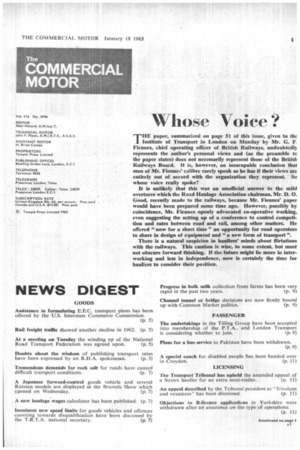Whose Voice ?
Page 3

If you've noticed an error in this article please click here to report it so we can fix it.
THE paper, summarized on page 51 of this issue, given to thc Institute of Transport in London on Monday by Mr. G. F. Fiennes, chief operating officer of British Railways, undoubtedly represents the author's personal views and (as the preamble to the paper states) does not necessarily represent those• of the British Railways Board. It is, however, an inescapable conclusion thal men of Mr. Fiennes' calibre rarely speak as he has if their views are entirely out of accord with the organization they represent. So whose voice really spoke?
It is unlikely that this was an unofficial answer to the mild overtures which the Road Haulage Association chairman, Mr. D. 0. Good, recently made to the railways, because Mr. Fiennes' paper would have been prepared some time ago. However, possibly by coincidence, Mr. Fiennes openly advocated co-operative working, even suggesting the setting up of a conference to control competition and rates between road and rail, among other matters. He offered "now for a short time" an opportunity for road operators to share in design of equipment and "a new form of transport ".
There is a natural suspicion in hauliers' minds about flirtations with the railways. This caution is wise, to some extent, but must not obscure forward thinking. If the future might lie more in interworking and less in independence, now is certainly the time for hauliers to consider their position.
































































































